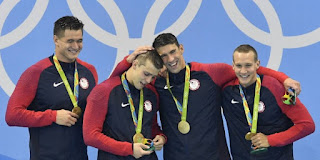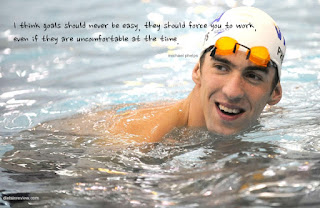As swim teams around the country are starting or about to start the new fall/winter season and begin another quadrennial (USA Swimming and it member clubs often create long term plans that follow the 4 year period leading up to and including the Olympics), there are so many things that can be taken away from the most recent Olympics in Rio. Coaches, swimmers, and parents can learn so much from the preparations leading up to the Olympics and the actual Olympics. I am going to focus on a few items from US Olympic team during the 2016 Rio Games that provide important lessons to coaches, swimmers and/or parents. These are listed in no specific order, but here it goes.
1. Katie Ledecky continued to force us to expand our thoughts on how fast and versatile a swimmer can be. In today's swimming environment, it is pretty much unheard of to have the range from sprinting to distance swimming that Katie Ledecky showed us at these Olympics. She was among the elite in the sprints (anchoring the silver medal winning 4 x 100 free relay and winning gold in the 200 free) and in a class of her own as she destroyed the competition while winning gold in the 400 and 800 free (for the 800 free no one else was in the wide TV view when she finished). I don't think we are finished seeing the broad range of ability by her. How fast she has taken women's distance swimming is amazing. To be put in perspective Janet Evans who for so many years held the 400 and 800 world free records with some amazing times of 4:03 and 8:16, respectively; those records are now 3:56 and 8:04 set by Katie Ledecky. When talking about improving world records, usually it is in terms of tenths of a second or maybe 1-2 seconds for the longer races, but not 7 or 12 seconds like Katie Ledecky has done. So, swimmers keep setting aggressive goals.
2. Michael Phelps showed us how important it is to love what you are doing and have fun during it all. Though swimming requires a lot of hard work, it is just as important to truly love it and have fun. You could see how much more fun he was having at these Olympics compared to 4 years ago in London. And his results showed the fun he was having. There were some classic Phelps moments. The one that stands out for me was Phelps' relay leg on the 4 x 100 free relay. Coming off his turn, Phelps showed probably his best ever underwater dolphin kick and breakout. He took what was a close race and turned it into a good lead for the US team that they never relinquished. Swimmers, if that example did not show you how important a good streamline dolphin kick underwater can be off turns, I don't know what else would convince you.
3. Missy Franklin showed us all great maturity and class in how one should handle a disappointing swim/meet. There were some great expectations for Missy Franklin, but it just did not happen for her. Missy Franklin struggled during these Olympics, but she was very humble and by all accounts kept trying and stayed upbeat in support of her teammates. I think I can say we all hope Missy Franklin can and will come back stronger than ever and continue to have more success in the pool.
4. Though this was not one of the positive parts of the Olympics, Ryan Lochte showed us how important and critical it is to be completely honest and truthful. Without going into all the detail of the incident he was involved in at the gas station, Ryan Lochte clearly showed bad judgment in not being 100% honest and truthful regarding what happened. By not doing that, you saw how out of control the incident became and was an embarrassment for the US Olympic team.
5. The many successes of the Olympic rookies. When it comes to Olympic experience, this was one of the youngest US Olympic teams in recent history. However, in the end it quite possibly was one of the best ever teams in terms of medals won. The rookies on the team time after time medaled. It all comes down to confidence and great team support. Always believe in yourself. Just as important, the team support showed how much more one can do when one knows their teammates are supporting them. I think I heard some statement supporting that during every interview of the relay teams.
6. Cody Miller and Dana Vollmer showed us though winning gold may be awesome, it is not everything. One can be rightfully ecstatic about winning a silver or bronze medal. Though neither won their events (they lost to some phenomenal world record breaking swims), the pure happiness they showed in performing their best even when it did not mean first place was so special. Only one swimmer (if there are no ties) can come in first, but that does not mean all the other finishers were not successful and won in some way. This is important for coaches, swimmers and parents to remember. Too often we can get caught up in judging how successful someone is based on wins/losses determined by place. It is important to look at the larger picture to determine success. Was it a best time? Did the swimmer improve a technique aspect that they have been working on lately? Was the goal to pace the race a certain way and was that accomplished? Or simply, did you try your best?

7. It is okay to show pride and emotion in how you have represented your team and just achieved one of your ultimate goals. During the medal ceremony for the men's 4 x 100 free relay where the USA team won gold, you saw how overcome with positive emotion Olympic rookie, Ryan Held, was. He was so overcome with emotion at winning gold while representing his country/Team USA and achieving the ultimate goal for almost any swimmer to win Olympic Gold. I know it made this coach/swimmer get choked up at the pure emotion Ryan Held showed.
8. Never give up! Anthony Ervin persevered and came back to win Olympic gold in the 50 free 16 years after the first time he did it. Not many thought he could even medal at these Olympics, but the old guy believed in himself and put it all together in the final and won the 50 free by 0.01!
9. In meets, with a prelims/finals format, often you will see surprises who moves onto the next round. At these Olympics, you saw some great swimmers that were expected to advance miss semifinals or finals. But, one must remember as long as you advance you still have a chance. A good belief to have is as long as you have a lane to swim in, you still have a chance. That was so true in the men's 100 free. In prelims, for whatever reason, Nathan Adrian (the defending Olympic champion) had a slow swim and was in jeopardy of not advancing to the semifinals. Luckily for him he squeaked into semifinals in the 16th and final spot. He showed another type of perseverance by coming back in the semifinals with the fastest semifinal time. He got another chance to swim after nearly missing the opportunity to advance and made the most of it (he ended up winning the bronze in the final).
10. And last is a very important historical occurrence during these Olympics. Slowly, swimming in the United States is becoming more racially diverse. We are finally starting to see more African American swimmers at all levels of the sport. During these Olympics, we all witnessed the first ever female African American win gold in an individual event. This happened when Simone Manuel tied for the win in the 100 free (while also breaking the American record). It is so great to see diversity starting to take hold in swimming.
 Whether you claim a result is a success
or a failure, it is not the final chapter. Determine what went right
and celebrate those aspects. However, also constructively evaluate
your performance for aspects that can be improved. Then develop a
plan to maintain the good aspects and ways to add to them going
forward. This is true for both successes and failures. As humans,
we are not perfect, always leaving chances to be better. Be proud of
your accomplishments, but be courageous in trying to be even better
next time.
Whether you claim a result is a success
or a failure, it is not the final chapter. Determine what went right
and celebrate those aspects. However, also constructively evaluate
your performance for aspects that can be improved. Then develop a
plan to maintain the good aspects and ways to add to them going
forward. This is true for both successes and failures. As humans,
we are not perfect, always leaving chances to be better. Be proud of
your accomplishments, but be courageous in trying to be even better
next time.




